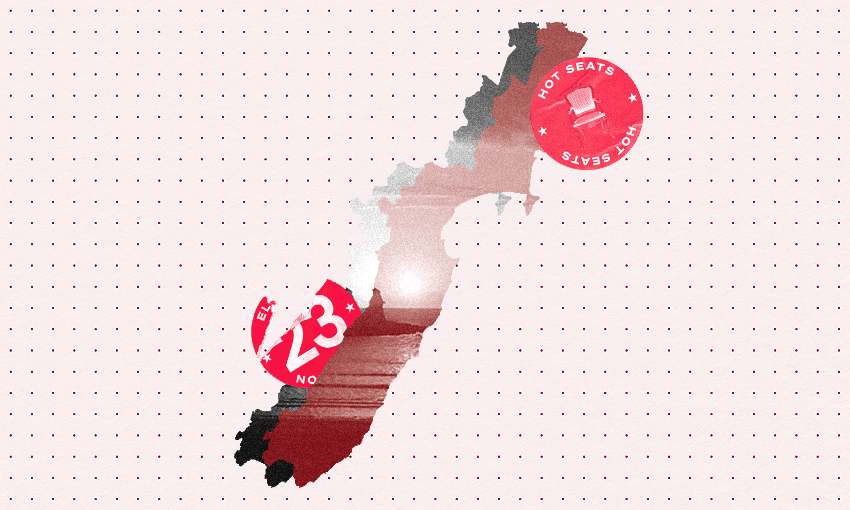The sitting MP delivered one of the shocks of the year – and an electorate race that could go down to the wire.
Read the other battleground electorate profiles in our Hot Seats series here.
More than 23 years of Labour stronghold in the electorate of Ikaroa-Rāwhiti came to an end in one of the big plot twists of New Zealand politics this year. Early in May, Meka Whaitiri revealed that she was quitting the party and her ministerial role to join Te Pāti Māori. The decision blindsided and destabilised Chris Hipkins’ government, and paved the way for an unusual and close-run contest for the Māori seat.
The long fish
It looks like a long fish on the east, so that’s what they called it: Ikaroa-Rāwhiti. Established in 1999 alongside Waiariki across parts of the motu formerly known as Te Tai Rāwhiti (itself the successor to Eastern Māori), Ikaroa-Rāwhiti is the place to watch the rising of the sun, stretching from the top of East Cape down to the Wellington suburb Wainuiomata. It will take you 10 hours to drive from one end of the rohe to the other.
For most of its 24 years, the seat was synonymous with Parekura Horomia. Ebullient and inspirational, the MP was minister for Māori Affairs for the course of Helen Clark’s government. He won five elections, though was run close a couple of times by the high-profile broadcaster Derek Fox.
Horomia was “someone who didn’t have a bad bone in his body”, said Pita Sharples, former co-leader of the Māori Party, at his tangi in 2013. He had been Whaitiri’s mentor, teaching her how to “use these [Māori] values and apply them to the Pākehā world without compromising”. She worked as an advisor in his office at parliament. She became his successor when she won the byelection following his death, going on to be re-elected in three general elections.
Labour’s candidate, Cushla Tangaere-Manuel, knew Horomia, too. He had approached her decades ago to sound out her interest in politics, but it wasn’t the time, she told Mata with Mihingarangi Forbes. “He laid a really strong foundation for the skills and ngākau I’d like to carry.”
The contenders
The shock defection of Whaitiri caused disruption and at times anger within the Labour Party and dismay among the party’s Māori caucus. Whaitiri’s decision, motivated by a wish to be “unshackled” in advocating for Māori, also delivered some upset within Te Pati Māori, as Heather Te Au-Skipworth, previously announced as candidate for the electorate, stepped aside. She later threw her support behind Labour’s Tangaere-Manuel.
If there was rancour in months past, however, the campaign trail has revealed none of that. Whaitiri and Tangaere-Manuel have not just been cordial but collegial during debates. That hasn’t delighted everyone, Tangaere-Manuel told Mata. “Some people have straight-up asked us to scrap.”
With a CV that includes time as a journalist, CEO for the Ngati Porou East Coast and Māori rugby programme manager at NZ Rugby, Tangaere-Manuel describes on Policy.nz her reason for standing in this way: “I was taught from a young age that if you have the skills to help people – you must. Right now Ikaroa-Rāwhiti needs a strong voice and caring heart to move through these challenging times. Our electorate is made up of beautiful rohe and people live here because they’re from here or love the regions. I want to empower that, ensuring our regions recover and thrive.”
At a Hawke’s Bay Today event, Whaitiri said: “I served Labour really loyally for 10 years – now I am on a new journey which is unapologetically Māori … We are proudly Māori. We have a party of the people. We’re here for you. We are answerable to you … We are not left, we are not right, we are up the guts. That is what our people deserve. We will work with anybody but the times that others speak for us, or that we are just one at a table, is over. This is a political movement that is totally different.”
A third candidate, Ata Tuhakaraina (Ngāti Hauā) is standing for Vision NZ. He is an advocate for Brian Tamaki’s Man Up programme, which he has personally completed. In standing, he hoped to “be some type of light to those who are struggling out there, that they can get up just like I did, and be able to change their lives around”.
According to a Whakaata Māori-Curia poll undertaken in September, however, the contest is a two-horse race between Tangaere-Manuel and Whaitiri. The Labour candidate was the choice of 47% of decided voters, with 36% backing the incumbent, now standing for Te Pāti Māori. There were, however, a large number of undecideds among the 500 polled: 29%.
Whaitiri is third on the TPM list; Tangaere-Manuel is electorate-only.
The issues
Cost of living emerged from the Curia poll as the issue most in the electorate were concerned about. Tangaere-Manuel told Whakaata Māori that constituents had told her they welcomed Labour measures such as the early childhood payment, the lift in benefits, the removal of prescription fees and the winter energy payment, while there were “global impacts at play here”. Whaitiri pointed to TPM policies including a tax-free threshold and the removal of GST from all food.
The ravages of Cyclone Gabrielle remain raw across the northern half of the electorate. Whaitiri rejected suggestions that she had “abandoned” people after Gabrielle given she had been minister responsible for cyclone recovery for the region. She told Whakaata Māori she is advocating “Māori solutions for communities that were devastated”. Tangaere-Manuel emphasised support from the Labour government for the cyclone recovery.
On Mata, the candidates were asked about education challenges, including the statistic that suggested, based on the last census, more than a third of people over 15 had no formal qualification. Tangaere-Manuel said greater focus needed to be placed on non-academic pathways such as cadetships. Whaitiri said she and her party would push for a Māori education authority.





